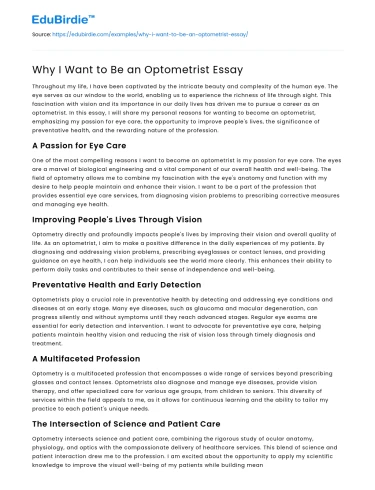Throughout my life, I have been captivated by the intricate beauty and complexity of the human eye. The eye serves as our window to the world, enabling us to experience the richness of life through sight. This fascination with vision and its importance in our daily lives has driven me to pursue a career as an optometrist. In this essay, I will share my personal reasons for wanting to become an optometrist, emphasizing my passion for eye care, the opportunity to improve people's lives, the significance of preventative health, and the rewarding nature of the profession.
A Passion for Eye Care
One of the most compelling reasons I want to become an optometrist is my passion for eye care. The eyes are a marvel of biological engineering and a vital component of our overall health and well-being. The field of optometry allows me to combine my fascination with the eye's anatomy and function with my desire to help people maintain and enhance their vision. I want to be a part of the profession that provides essential eye care services, from diagnosing vision problems to prescribing corrective measures and managing eye health.
Improving People's Lives Through Vision
Optometry directly and profoundly impacts people's lives by improving their vision and overall quality of life. As an optometrist, I aim to make a positive difference in the daily experiences of my patients. By diagnosing and addressing vision problems, prescribing eyeglasses or contact lenses, and providing guidance on eye health, I can help individuals see the world more clearly. This enhances their ability to perform daily tasks and contributes to their sense of independence and well-being.
Preventative Health and Early Detection
Optometrists play a crucial role in preventative health by detecting and addressing eye conditions and diseases at an early stage. Many eye diseases, such as glaucoma and macular degeneration, can progress silently and without symptoms until they reach advanced stages. Regular eye exams are essential for early detection and intervention. I want to advocate for preventative eye care, helping patients maintain healthy vision and reducing the risk of vision loss through timely diagnosis and treatment.
A Multifaceted Profession
Optometry is a multifaceted profession that encompasses a wide range of services beyond prescribing glasses and contact lenses. Optometrists also diagnose and manage eye diseases, provide vision therapy, and offer specialized care for various age groups, from children to seniors. This diversity of services within the field appeals to me, as it allows for continuous learning and the ability to tailor my practice to each patient's unique needs.
The Intersection of Science and Patient Care
Optometry intersects science and patient care, combining the rigorous study of ocular anatomy, physiology, and optics with the compassionate delivery of healthcare services. This blend of science and patient interaction drew me to the profession. I am excited about the opportunity to apply my scientific knowledge to improve the visual well-being of my patients while building meaningful relationships with them based on trust and care.
Embracing Technological Advancements
The field of optometry is continually evolving with advancements in technology and research. As an aspiring optometrist, I am eager to embrace these innovations to provide the best possible care for my patients. From state-of-the-art diagnostic equipment to cutting-edge treatments for eye diseases, staying at the forefront of technology is integral to the profession. I am excited about the potential to leverage these advancements to enhance patient outcomes and experiences.
A Rewarding and Fulfilling Profession
Optometry is a rewarding and fulfilling profession that offers the satisfaction of making a tangible impact on people's lives. When I imagine a future as an optometrist, I see myself helping children see the chalkboard clearly, enabling adults to excel at their jobs, and ensuring that seniors maintain their independence and quality of life. The gratitude and smiles of patients who can see more clearly after a visit to the optometrist are priceless rewards that motivate me to pursue this career path.
Conclusion
In conclusion, my desire to become an optometrist is rooted in my passion for eye care, the opportunity to improve people's lives through vision enhancement, the importance of preventative health, and the rewarding nature of the profession. Optometry offers the chance to combine scientific knowledge with patient care, address a wide range of vision and eye health needs, and embrace technological advancements to benefit patients. As I embark on this journey, I am driven by a deep sense of purpose and the aspiration to be a healthcare professional who plays a vital role in preserving and enhancing one of the most precious senses – sight.






 Stuck on your essay?
Stuck on your essay?

